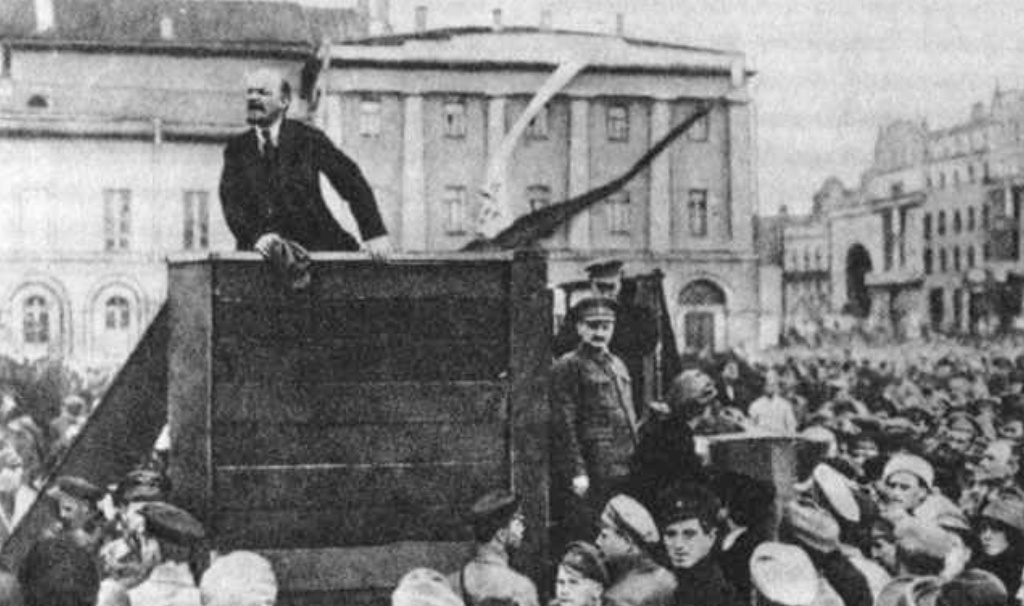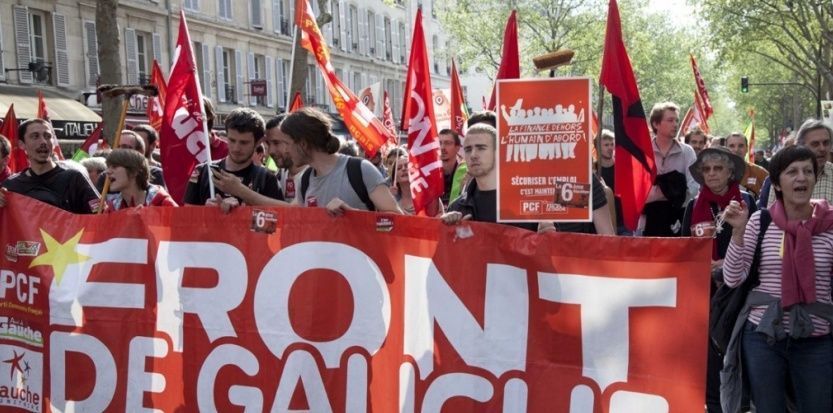In October 1917, the workers, with support of the poor peasants, took power in Russia. The ruling minority were out of power. For the first and only time in history, the majority of people were in charge of a country.
In the February revolution, as in all revolutions, the mass of people entered the stage of history. February produced unstable dual power divided between the Soviets and the Provisional Government. The Soviets (councils) were democratic and directly elected delegates of workers, soldier and peasants. The Provisional Government, nominally in charge, was made up of unelected, self-appointed liberal, capitalist and moderate socialist politicians.
February’s slogans were “Peace, Bread and Land.” Months later none of these demands had been realised: the war continued, the feudal lords still held the land, and the workers and peasants were hungry.
What Sort of Revolution?
In February, the moderate socialists, the Mensheviks and Social Revolutionaries (SRs), a peasant-based party, won a majority in the Soviets. Their road seemed easy to the workers and peasants; elect us and we will deliver the demands of the revolution.
The Mensheviks and SRs thought Russia was too backward, a feudal society lacking in modern industry, to become a socialist society. Their view was that capitalists had to lead Russia, distribute land and develop the economy, while the workers and peasants would be a loyal opposition pushing for democratic and social reforms.
However, the capitalist class in Russia was weak, tied to Russia’s feudal lords and the international capitalists. Tied to feudalism, they refused to give land to the peasants. Tied to international capitalism, they continued the war. Fearful of the masses, they refused to mobilize the workers and peasants to end feudalism and foreign domination. The capitalists hated dual power, as it meant that the workers, soldiers and peasants had some control over the government. They preferred to crush the revolution rather than complete it.
In February, the Bolsheviks were a minority in the Soviets. After Lenin’s return from exile in April, the Bolsheviks’ program was “All Power to the Soviets.” They agreed with the Mensheviks that Russia was backward and mainly feudal. However, they argued that the capitalists were incapable of leading the revolution to deliver the key demands or to develop a modern capitalist country with democratic rights, free labour unions, land distribution, etc. The Bolsheviks and Trotsky, who joined the Bolsheviks in July, argued that only the working class, with the support of the poor peasants, could finish the February revolution.
As the Mensheviks and SRs failed to deliver, the Bolsheviks patiently and consistently campaigned for “Peace, Bread and Land,” and “All Power to the Soviets.” The Bolsheviks’ leadership in defeating the coup led by Kornilov, the head of the army, resulted in them winning a majority in Soviets across Russia.
Internationalism was central to the Bolsheviks’ outlook. The war was provoking a revolutionary mood in Europe; a successful revolution in Russia would turn this mood into revolutions. Workers’ governments in Russia and more developed and industrialized countries, such as Germany, could develop a socialist society.
Russian Tinderbox
In autumn 1917 Russia was a tinderbox, with all the unresolved contradictions and tensions at breaking point.
The peasants, tired of waiting for land increasingly seized land and machinery and sometimes destroyed the feudal lords’ mansions. The oppressed nationalities, weary of continued Russian oppression, were beginning to turn away from the revolution to support nationalist leaders, often reactionary and chauvinist feudal lords. As the war dragged on, the army was disintegrating with over two million desertions, refusals to carry out orders and the killing of officers. In the cities, the workers were impatient for change.
The Provisional Government was unable to act on any of the issues of society and its authority was draining away.
Defend the Revolution: All Power to Soviets
All the contractions of dual power and the unfinished revolution were at boiling point. There was a grave danger that the revolution would disintegrate into sporadic peasant uprisings, nationalist breakaways with reactionary governments, army mutinies and workers’ demoralization. Lenin urged the Bolsheviks to take power to save the revolution.
Meanwhile, Prime Minister Kerensky, an SR, prepared to crush the Bolsheviks, ordering troops loyal to the Petrograd Soviet to the front while moving troops supposedly loyal to the Provisional Government towards Petrograd.
The all-Russia Congress of Soviets was called for October 25 (November 7 in the new calendar). Would it meet with the workers in power or surrounded by a ring of anti-Soviet troops? Kerensky sent out futile orders to troop to crush the Soviets, which were defied, and to close the Bolshevik printing press – again defied.
Mass meetings of workers and soldiers across Petrograd all voiced the view “we can go no farther, we must break a road into the future.” They demanded the Soviets take power and finish the revolution.
The Military Revolutionary Committee of the Petrograd Soviet, with Trotsky’s leadership, acted to deliver workers’ power. The committee ensured that the soldiers and navy supported the Soviets. Groups of soldiers, sailors and workers’ militias peacefully ensured that the Soviets controlled all key installations in Petrograd – railways, banks, stock exchange, telephone, etc. There was no resistance – the Provisional Government had lost all support among the masses. Even most of the army officers refused to defend it. The Provisional government was arrested without resistance. Right-winger, Nabokov wrote, “The ease with which Lenin and Trotsky overthrew the [provisional government] revealed its impotence.”
On October 25, the Congress of Soviets gathered, overwhelmingly delegates of the people: poor men and women, unshaven soldiers in battered boots and coats, workers in worn out clothes, all tired and hungry – for food and change. Immediately the Congress agreed to end the war, give land to the peasants, take control of production and more. The congress did more in hours than the Provisional Government had done in months.
There were many complications ahead, but for the first time in history, the people had power in their hands. The October revolution was the voice of the masses. However, without the Bolsheviks it would have ended in blood, a new coup crushing all those hopes and dreams. The Bolsheviks over the months patiently explained the need to finish the revolution, steadily won support in the Soviets and the army, organized Kornilov’s defeat, and planned and carried out the Soviets taking power.
Words 1054




